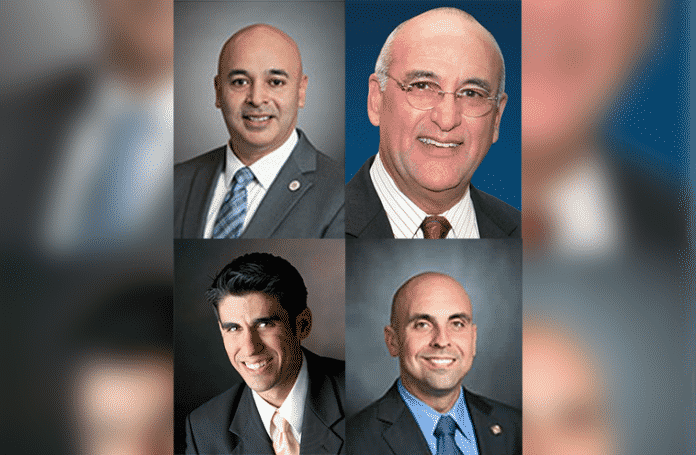In an effort to once again stymie their Republican counterparts’ attempts to push through a polarizing voting bill in the state, nearly 60 Democrats in the Texas House of Representatives broke quorum Monday and headed for the U.S. Capitol. They had company with lawmakers from the Rio Grande Valley.
State Reps. Bobby Guerra, D-McAllen; Armando “Mando” Martinez, D-Weslaco; and Brownsville lawmakers Eddie Lucio III and Alex Dominguez joined the Democratic contingent in Washington to pressure Congress to pass the For the People Act and the John Lewis Voting Rights Act. These bills are aimed at protecting and expanding voting rights.
The move came with 26 days remaining in Gov. Greg Abbott’s special legislative session, of which Abbott and Texas Republican legislators hoped to pass new voting restrictions.
“We’ve been trying to negotiate some of these bills with our Republican counterparts for over 48 hours so it didn’t have to come to this, and they just weren’t budging despite all the testimony showing that their position was flawed,” Dominguez said Monday evening after arriving in Washington.
Dominguez said he anticipates unity among his local colleagues in fighting Abbott’s proposed voting restrictions.
“It’s something that we all take seriously,” Dominguez said. “I would hope that all the Valley guys remember the history that we have had with voting rights, and I hope they feel similarly.”
Dominguez said the Texas Democrats will be meeting with members of Congress to get the For the People and John Lewis Voting Rights acts passed, and anticipates staying in Washington for upwards of 30 days if necessary.
“We’re going to get together with a bunch of people here in D.C.,” Dominguez said. “We’re going to be talking about legislation that is before the federal government — Congress and the Senate — and we’ll talk about what we can do to get that legislation passed. If that legislation passes, then the bill that the governor wants to pass will have no effect.”
Earlier Monday afternoon, members of the Texas House Democratic Caucus released a joint statement in reference to the Democrats breaking quorum for now the second time — the first coming on the last day of the session near midnight May 30, when Democrats walked out to prevent Senate Bill 7, on voting restrictions, from passing.
“Today, Texas House Democrats stand united in our decision to break quorum and refuse to let the Republican-led legislature force through dangerous legislation that would trample on Texans’ freedom to vote,” the statement read. “We are now taking the fight to our nation’s Capitol. We are living on borrowed time in Texas. We need Congress to act now to pass the For the People Act and the John Lewis Voting Rights Act to protect Texans — and all Americans — from the Trump Republicans’ nationwide war on democracy.”
Abbott also released a statement Monday and called for bipartisanship.
“Texas Democrats’ decision to break a quorum of the Texas Legislature and abandon the Texas State Capitol inflicts harm on the very Texans who elected them to serve,” Abbott’s statement read. “As they fly across the country on cushy private planes, they leave undone issues that can help their districts and our state.”
Abbott’s statement listed some of the other 11 items on the agenda for the special legislative session, however did not mention his proposed voting restrictions.
“The Democrats must put aside partisan political games and get back to the job they were elected to do,” his statement continued. “Their constituents must not be denied these important resources simply because their elected representative refused to show up to work.”
Dominguez said that he will be declining the per diem state payment while he is in Washington.
“I’m away from my family, my 2-year-old son, I’m away from my job, and on top of that I’ve also submitted a letter that I will be declining the per diem state payment,” Dominguez said. “I will not be getting paid by the state for being here.”





